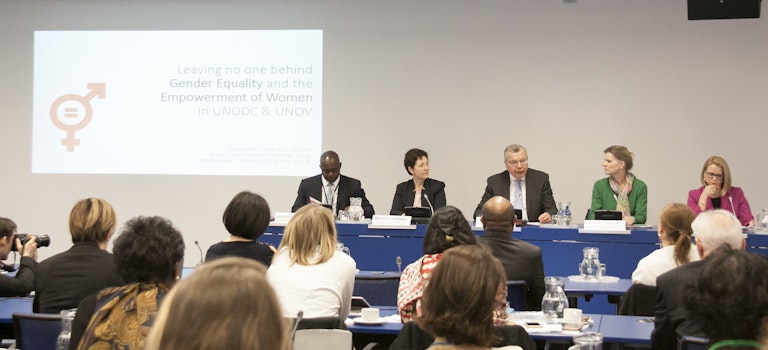14 March 2018
Drugs and crime continue to affect societies all over the world but their impact on women and girls can be different. This is being addressed in the new Strategy for Gender Equality and the Empowerment of Women for UNODC and the United Nations Office at Vienna (UNOV), which has been presented at a side-event of the 61st session of the Commission on Narcotic Drugs.
The gender equality strategy, the first one for UNODC, sets out a framework for taking into account the needs of women and girls when tackling drugs and crime. It sets institutional standards and outlines a comprehensive set of commitments on gender equality for the next four years, which will help improve the lives of women and girls through the work of UNODC and UNOV.
Speaking at the side-event, UNODC Executive Director and International Gender Champion, Yury Fedotov, said:
The importance of gender mainstreaming and addressing the specific needs of women and girls is clear across our mandate.
He added that the Strategy would advance UNODC's support to Member States to mainstream gender in drug control, crime prevention and criminal justice activities, and work towards the Sustainable Development Goals.
Also participating, Permanent Representative of Sweden to the International Organizations in Vienna and International Gender Champion, Helen Eduards, defined gender equality and the empowerment of women as a clear priority for her country.
As a representative of the world's first feminist government, I firmly believe that we must all work to achieve gender mainstreaming across the board and secure female representation in leadership positions.
In a video message, the Executive Director of UN Women Phumzile Mlambo-Ngcuka, also an International Gender Champion in New York. commended the Executive Director of UNODC, his senior management and staff for developing a strategy that is fully aligned with the Secretary-General's Strategy on gender parity and the System-wide Action Plan on Gender Equality and the Empowerment of Women. Ms. Mlambo-Ngcuka also spoke of the importance of leaving no one behind:
We are all better off when we open the doors of opportunity for women and girls in all aspects of life-in law enforcement, in health services, in the judiciary and prosecutorial authorities, in border control and port control and at peace talks.
The United Nations System-wide Strategy on Gender Parity, launched by the Secretary-General last September, includes the recommendation to reach gender parity across the Organization by 2028. In her remarks, Senior Advisor of UN Women Katja Pehrman said:
This goal is not just about numbers, but about transforming the UN's institutional culture. It is about creating a working environment that embraces equality, eradicates bias and is inclusive of all staff.
Gender inequality persists worldwide, impedes the achievement of the Sustainable Development Goals. UNODC contributes to attaining the goals including Goal 5 on gender equality, as well as supporting Member States to address organized crime and to promote illegal drug demand reduction. Progress on gender equality is fundamental for realizing human rights for all, creating and sustaining peaceful and socially inclusive societies, where the benefits of development are equitably shared.
For futher information, please see UNODC's article.
